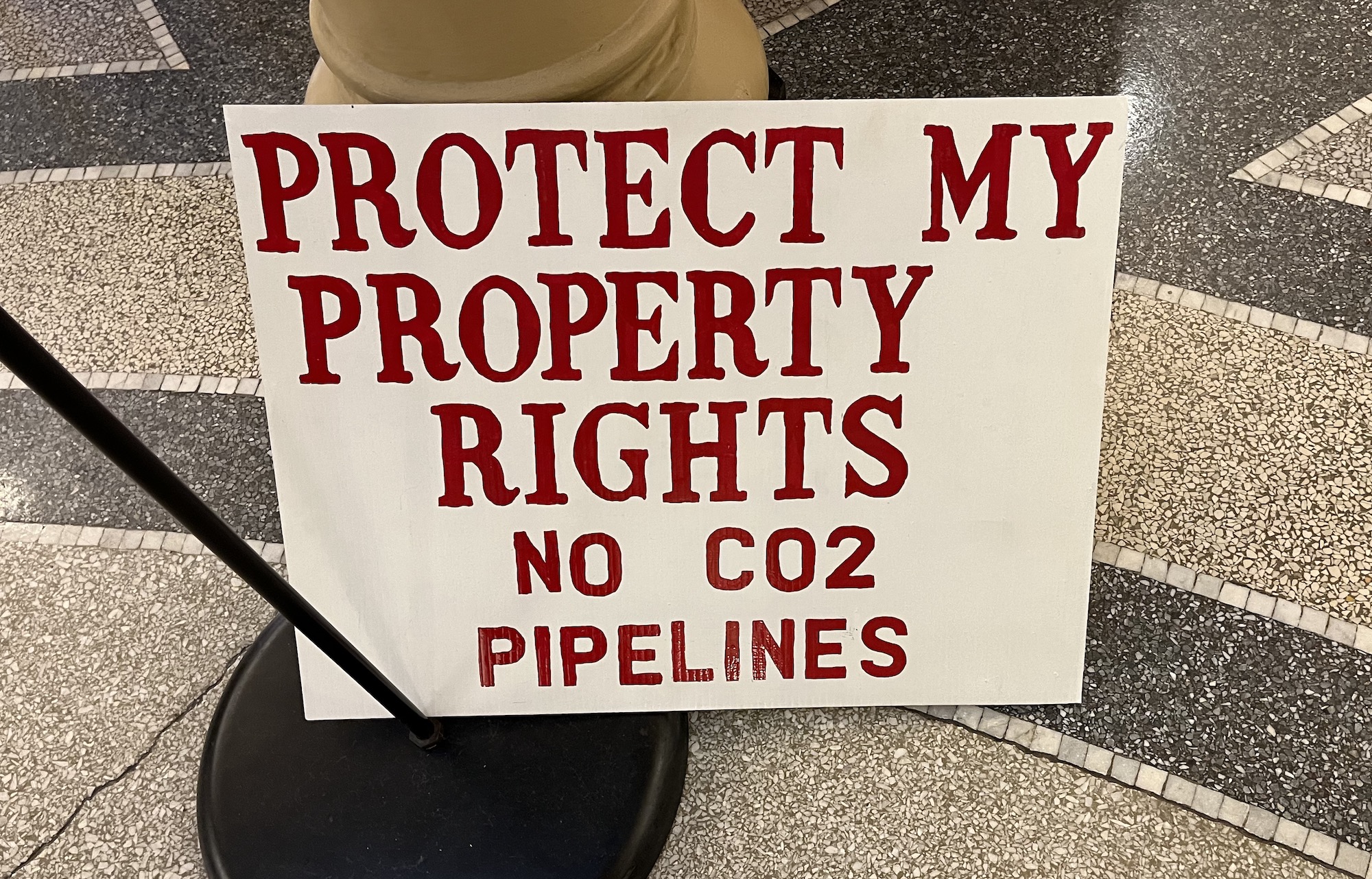Jared Strong is senior reporter for Iowa Capital Dispatch, where this article first appeared. Under a state law that took effect July 1, the Iowa Utilities Board was renamed the Iowa Utilities Commission.
Legislators, counties, conservation groups, and landowners have asked state regulators to reconsider their permit approval for an expansive carbon dioxide pipeline system in Iowa.
A total of eight motions were filed with the Iowa Utilities Commission in the past week before a procedural deadline on July 15, and they are likely precursors to lawsuits in state court.
The commission last month approved a proposal by Summit Carbon Solutions to construct about 690 miles of pipe in Iowa to transport captured carbon dioxide from ethanol plants. The company has already sought to expand its footprint by more than 300 feet to connect to more of the facilities.
The motions to reconsider were filed by:
— Sierra Club of Iowa, a conservation group that has been key to organizing opposition to the project.
— Republican Legislative Intervenors for Justice, a group of 26 state representatives and eleven state senators who oppose the use of eminent domain for the project. [All are listed below.]
— Brian Jorde, an attorney who is the leading representative of affected landowners who oppose the project.
— Tim Whipple, an attorney who represents Dickinson, Emmet, Floyd, Kossuth, Shelby, Woodbury and Wright counties.
— Hardin County
— Gordon Garrison, a landowner in Emmet County.
— Gregory and Erica Kracht, landowners in Lyon County.
— Bold Iowa, which was originally formed to oppose the Dakota Access oil pipeline. It advocates for climate change solutions and opposes eminent domain for the pipelines.
Opposition to the use of eminent domain—in which Summit will be able to force unwilling landowners to host its pipeline network—is a common thread of the motions to reconsider. A Des Moines Register/Mediacom Iowa Poll last year showed that 78 percent of Iowans opposed using eminent domain for that purpose.
“The bottom line is that a private entity like Summit cannot be granted the power of eminent domain unless it is a common carrier,” the Sierra Club wrote in its motion to reconsider. “But the evidence showed that Summit is not a common carrier. It will be contracting individually with ethanol plants, not the public generally, and it will own the carbon dioxide, so it will be carrying its own product, not carrying a product for hire.”
The IUC used a self-designed “balancing test” that considered a number of factors to determine whether the project benefits the public. That test overwhelmingly favored a permit for Summit, and those who oppose the project say its conclusions were flawed.
The group of Republican lawmakers further said the IUC’s process precluded input from many people who might be affected by the project, including those who live close enough to the pipeline route to be threatened by a potential pipeline breach but far enough away to not be in the pipeline’s direct path.
Catastrophic pipeline failures have the potential to release a plume of carbon dioxide that, under certain atmospheric conditions, can travel long distances and asphyxiate people and animals.
“A significant number of Iowans—those who are in the kill zone but who are not yet aware of their status—have been excluded from even rudimentary due process in the IUC’s consideration of the Summit application,” the lawmakers wrote.
The three-member IUC has 30 days to respond to the motions, after which the groups can take their objections to court.
Summit Carbon wants to lay about 2,500 miles of pipe in five states to transport the greenhouse gas to North Dakota for underground storage. It has not yet obtained permits in North and South Dakota, which is a requirement for the company to start construction in Iowa.
Editor’s note from Laura Belin: All the motions to reconsider the order approving Summit Carbon’s pipeline application can be found in the docket on the Iowa Utilities Commission’s website. A number of other Iowans separately filed objections to the order. Democratic State Representative Chuck Isenhart asked the commission to correct the “faulty reference” to his testimony in its order.
Here is the full list of GOP legislators now part of Republican Legislative Intervenors for Justice:
- Senator Kevin Alons
- Senator Rocky De Witt
- Senator Lynn Evans
- Senator Jesse Green
- Senator Dennis Guth
- Senator Mark Lofgren
- Senator David Rowley
- Senator Sandy Salmon
- Senator Jason Schultz
- Senator Jeff Taylor
- Senator Cherielynn Westrich
- Representative Eddie Andrews
- Representative Brooke Boden
- Representative Steven Bradley
- Representative Ken Carlson
- Representative Mark Cisneros
- Representative Zach Dieken
- Representative Dean Fisher
- Representative Dan Gehlbach
- Representative Thomas Gerhold
- Representative Cindy Golding
- Representative Helena Hayes
- Representative Bob Henderson
- Representative Steven Holt
- Representative Heather Hora
- Representative Thomas Jeneary
- Representative Bobby Kaufmann
- Representative Joshua Meggers
- Representative Anne Osmundson
- Representative Brad Sherman
- Representative Jeff Shipley
- Representative Luana Stoltenberg
- Representative Henry Stone
- Representative Mark Thompson
- Representative Charles Thomson
- Representative Skyler Wheeler
- Representative Derek Wulf

